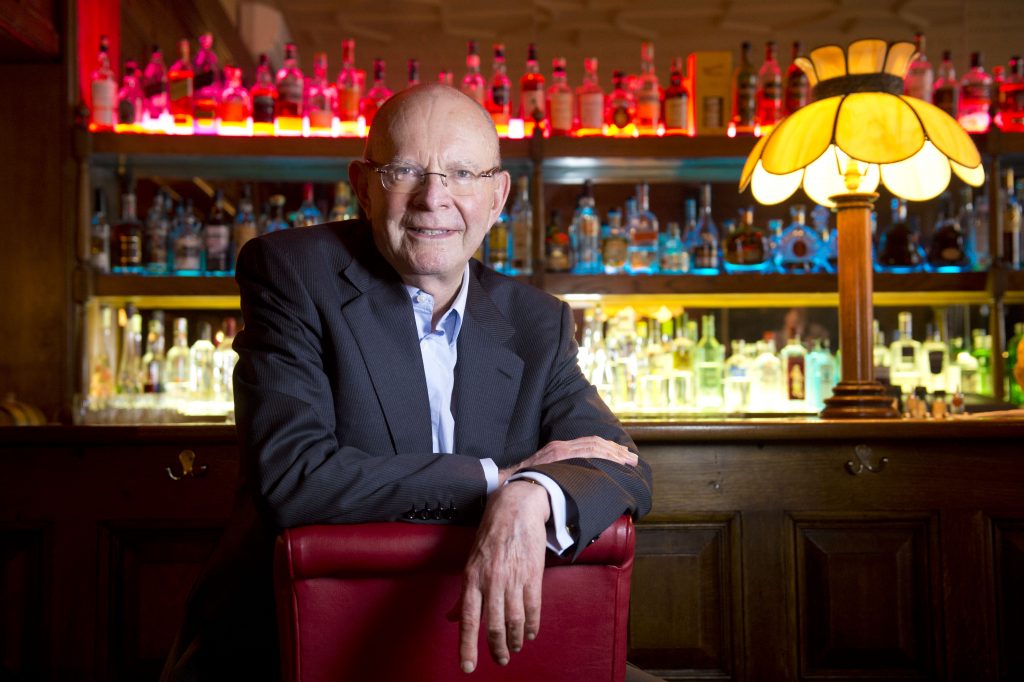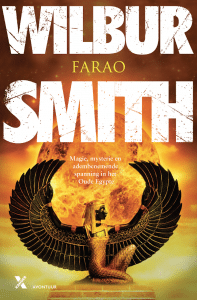More than 120 million books have sold bestselling author Wilbur Smith - two thousand Wembley stadiums full. His steady recipe - violence, magic, mystery, adventure, hunting and sex - has kept his readership enthralled for more than half a century. To keep his output high, he has recently started working with co-authors. Only the 'Egypt novels', which include his new book Pharaoh belongs, he writes himself.
He turns 84 in early January, but Smith enjoys every day given to him. He still travels the world with his 39 years younger wife Mokhiniso. Life smiles at him - he himself calls it 'Wilbur's Luck' with a wink. 'I am a lucky guy. Everything I touch turns to gold and crystal.'
Old friends
Worldwide, you have sold more than 120 million books. How high do you rank in the top-ten bestselling authors?
'(Laughs) 'I wouldn't know, because I don't compete with anyone. I just do my own thing and fortunately I have a lot of people who follow me and enjoy my nonsense and games. Some have been with me since their teens, so those are all now' (he rubs his smooth skull for a moment) 'grey-haired ladies and gentlemen like me. My wife Niso maintains my Facebook page and takes care of the mail. About five to six hundred letters a day arrive - often from well-known senders, readers who say: this is another great book, well done, Wilbur! They are happy letters from old friends, even though we have never met.''
Pharaoh is the latest volume in the Egypt series. However, most of your books are set in southern Africa. What inspired you to start writing about the Egypt of centuries ago?
''That goes way back, to the discovery of Tutankhamun's tomb by Howard Carter, several years before I was born. My mother, an erudite and well-read woman, saw the importance of that great event and read everything she could find about it. To me, she told fascinating stories about that young prince who had died so early, murdered by his evil uncle - ingredients from a good novel by Wilbur Smith. So when I got the chance to travel to other countries - until I was 30, I had never set foot outside South Africa - Cairo was the first place I went. The Egyptian Museum, Tutankhamun's tomb. It fascinated me profoundly: the story, the beauty of the objects they extracted from his tomb. That has fascinated me throughout my life. The main character Taita is based on that.''
You once said that Taita has a lot in common with yourself, is that true?
'(Laughs) 'Of course, I created him, so I modelled him on my own failures and merits. He is a knowledgeable, knowledgeable man and he is very self-righteous about that. He thinks he is always right. Just like me. I am always right, though I don't argue with others about that. I just think: if that's what you want to believe, fine, but stay away from me. Since the age of 30, I have been independent, doing exactly what I thought was right for myself. So yes, Taita is a lot like me. When I read any of the earlier books I wrote about him, I still enjoy those similarities.''
He's not exactly a modest man, is he?
'(Laughs) 'No, he is certainly not modest. He knows his worth and what the world owes him, and that he himself hardly owes the world anything.''

Different series
Do you work on the various series simultaneously, or do you think at some point: now I feel like another Egypt novel?
''I work on one book at a time, because while writing I switch off my thoughts and become the central figure in some way. Some are contemporary stories, some are set in ancient times, some are set in Africa, some elsewhere. The more I see of the world, the more I have to write about. The Taita novels give me the most pleasure because Taita and I go through life with the same irony, allowing us to bear the setbacks and enjoy the successes. When something has succeeded, he gives me a wink, and then I know exactly what he means.''
Is he speaking to you?
''Not in the way you might think now, but ideas do come from somewhere. They had to come from him, because sometimes they are such ridiculous ideas that I could never have come up with them myself. Sometimes I hit a dead end and don't know where to go with the story, or how Taita should credibly extricate herself from predicaments. But then I wake up the next morning and Taita has planted a seed in my head during my sleep and the solution presents itself. Then I move on with that and continue our journey, which I hope will continue for many years to come.''
Literary freedom
You mentioned earlier that the Egypt series also gives you more literary freedom because it is set in a time nobody knows anything about anyway, allowing you to let your imagination run wild.
''You describe that excellently, I couldn't have put it better myself. [Laughs] The other series are much closer to our times, so they are defined by historical facts. The Egypt books are set in the time of man who can just write and formulate his thoughts.''
The way they express themselves is sometimes quite modern. Do you do that consciously?
''I love dialogues, the interaction between opinions and thoughts. For me, it would be counterproductive to try to write in a language that makes no sense today. That would make it difficult and illogical, and impossible to express what I want to say. So I write in correct English to thereby advance the plot, and let the characters continue to live in their own world. Taita and I speak the same language, but his thinking differs from mine - for him, the earth was flat. I enjoy puzzling out what conceptions made sense at the time, even if time has proven them to be completely wrong. That amuses me, and many of my readers.''
Your books are also often quite violent. Even after half a century, what continues to fascinate you about violence?
''The evil of which man is capable is terrible and beyond all imagination. Just this morning, I read about a man who is now in prison in England for killing eighty-five people, just for his own pleasure. Having been involved in the war in Rhodesia, I have seen blood spilt. Little children dismembered, bodies hung in trees - horror. Nothing can justify that. At the same time, there are also people whose beauty of spirit rises above everything and who give or sacrifice themselves for humanity. I want to write about that just as much. It is human beings that permanently fascinate me.''
Working with co-authors
As you get older, are you...
''Who, me?
... started working with co-authors, as you intended?
In the past year and a half, I have found three writers with whom I would like to work. They are accomplished writers who have published books - góéde books, I think - but have not yet broken through. The Taita books are exclusively by Wilbur Smith and Taita himself, but with other novels, such as Predator, I now work with them. They accept my guidance and command, but sometimes make counter suggestions of their own. So I now have four identities: the Wilbur Smith who writes Taita stories and three other Wilbur Smiths, one of whom is a woman.
If I were writing alone, the result would probably be slightly different, but Wilbur Smith is definitely present in the novels. This method of working satisfies me. I call the shots. I have the most amazing profession in the world, but it is also a lonely one. I have discovered that it is nice to work with others every now and then. As long as I am the boss.' (Laughs)'
Also, do your readers know that their new Wilbur Smith is now being written by someone else?
''Most readers seem to have no problems with it, although I have also received letters from people who never want to read another book of mine that is not mine. I take that as a compliment. When I was thirty-five, my energy knew no bounds, but now that I am running towards eighty-five, it takes me longer to write a book, and so that would greatly limit the number of stories I can still write. With co-authors, I can maintain the pace I have always been used to: about two books a year.''
Is time starting to catch up with you?
''No, I have time on my side. Things are on my side. When I get up in the morning and have done my stretching exercises, I feel forty-five. The woman who loves me and the books I write are the most important things in my life. Writing gives me boundless satisfaction and pleasure. It is something I wanted to do and have proved I can do. My wife and I still travel a lot. I have been able to do everything I wanted: I have skied, fished, travelled. I've been very lucky.''
This year, you founded the Wilbur and Niso Smith Foundation. Would you like to boost the genre you write in?
''When I started looking for a coauthor, I realised how many people have sometimes written damn good books but achieve nothing. So Niso and I set up a foundation to help them get a foot in the door. We award three prizes every year: one for the best published adventure novel, one for the best unpublished novel, and one for beginning writers up to the age of twenty-one. Very different authors participate. Some are like a new Wilbur Smith.''
Is that possible, a new Wilbur Smith?
'(Laughs) 'In theory maybe, but of course not really. When I'm gone, I'm gone.''
Wilbur Smith (9 January 1933) was born in Northern Rhodesia (now Zambia), where he grew up on his father's twelve-thousand-acre ranch. At eight, he got his first rifle, and he always remained a lover of hunting. He inherited his love of books from his mother. At his own request, he went to boarding school in South Africa, which he soon regretted, but where he had to stay anyway and then continued to study. Smith wanted to be a journalist, but after his father talked that idea out of his head, he went to work as an accountant. After two short-lived marriages (which also produced children), he decided to go his own way. He made his debut as a writer in 1964. Since then, he has written over thirty adventure novels, mainly set in South Africa and divided into several series, including the Ballantyne series, the Courtney series, the Egypt series and the Hector Cross series. Several books have been filmed. Wilbur Smith lives alternately in London and Cape Town.

